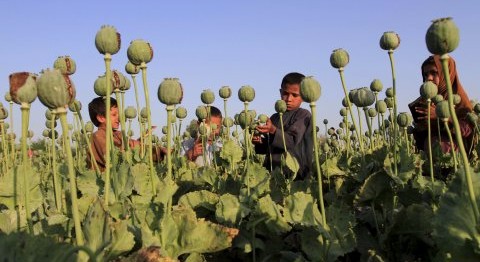 |
| Afghan children gathering opium pods. |
This is a highly dangerous move that could upset the delicate balance of tribal loyalties and piss off a lot of hard-assed Afghani tribesmen, who might then decide that the Taliban have a point after all.
According to the Washington Post (no link as it is paywall), the Pentagon unleashed F-22 Raptor stealth fighters, B-52 bombers, and Afghan A-29 Super Tucanos to bomb narcotic production facilities in the South of the country. The operation, designed to hit Taliban revenue streams, started on Sunday (19th November) and continued into Monday.
"This represents the first significant use of new legal authorities granted by the Trump administration in August that enable the Pentagon to target Taliban revenue streams, said Army Gen. John W. Nicholson Jr., the top U.S. commander in Afghanistan.
Previously, the U.S. military conducted strikes only when facing imminent threat or working directly with the Afghans.
Nicholson said, the F-22 “was used because of its ability to deliver precision munitions — in this case, a 250-pound bomb, small-diameter, that causes the minimal amount of collateral damage.” The objective for more precise munitions comes at a time where civilian deaths in U.S. airstrikes have been heavily scrutinized. Earlier this month, U.S. airstrikes in the region killed ‘at least 13 civilians’ in a bombing raid."
According to the Drug Enforcement Administration, there are up to 500 narcotic production facilities across Afghanistan, with 90% of the world's heroin being produced there. The air strikes are believed to have destroyed or partially damaged around ten drug labs. No doubt the other 490 will have little trouble taking up the slack.
 |
| An F-22, $150 million per plane, plus $50,000 per flying hour. |
Before the US invasion in 2001, the Taliban, which controlled most of the country, had banned the growing of opium poppies, leading to a massive fall in drug production. In fact, this was one of the reason it was comparatively easy for US-backed forces to topple the Taliban -- their hard line on drugs had made them many enemies. They have since reversed this policy, in order to finance their "holy war" against the "infidel invader."
Now the US seems to be repeating the mistakes made by the Taliban back then, with a policy that is (a) largely ineffective, as drug labs can easily be set up anywhere and embedded in the civilian population, and (b) guaranteed to antagonise a lot of neutral Afghanis who view the opium industry as the only way to provide for their families.


























